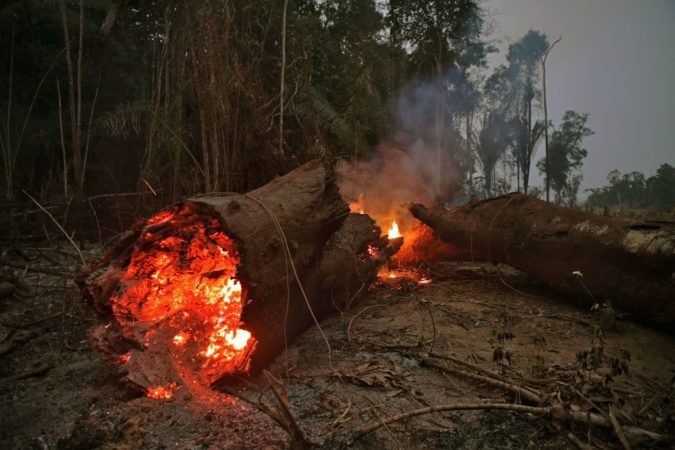The Amazon Fires: What do they tell us about nationalism and minority exploitation?

Last year, the far-right populist leader, Jair Bolsonaro, was elected as the President of Brazil in a narrow victory against his more leftist rival, Fernando Haddad. Bolsonaro ran his presidential campaign with a fervent promise to eliminate corruption and drive out an alleged communist threat from the country. His presidency, however, manifested itself in an unsurprising usurpation of power and rapid nationalist leanings. What followed after his election as president was not just voter frustrations amongst the progressivists in Brazil, but also a series of nationalist policies, the consequences of which can be traced to the infamous Amazon fires.
This month has seen a frenzy in global concerns over the raging Amazon fires. Although the phenomenon of wildfires and even illegal slash-and-burn agricultural practices are far from new to the region, the contemporary spike in these “wildfires” is concerning mainly due to two reasons: it is accompanied by a rise in nationalism and a subsequent decline in the concern for the international community.
Bolsonaro’s far-right policies: the outcomes of nationalist capitalism to blame for the Amazon fires

Conservationists all across the world, and especially in Brazil, have gone after Bolsonaro as the main cause for the aggravation of the Amazon fires. The far-right have been accused of much desensitization toward collective growth including the rise in reactionary violence toward “outsiders” or minority communities. Negating the climate crisis for short-term economic gains is stark evidence of how the idea of internationalism and collective growth – i.e. something that is a presupposition for our long-term survival on the planet – is waning in the face of immediate economic profit for a particular country. Bolsonaro’s policies echo the same capitalist concern of utilizing any and every resource available in Brazil in order to secure his presidency and monopolize production within the country.
The Amazon fires, as speculated by many, were not spontaneous natural disasters. These were deliberately started by farmers looking to clear the forested area so as to illegally create pasture grounds for their cattle. So where does nationalism come into play amidst the Amazonian fires? Bolsonaro, who notoriously told people to call him the “Chainsaw Captain”[i], has long voiced his support for clearing the Amazon to benefit Brazil’s economy. According to him, Brazil’s economy has suffered because of international concern to preserve the Amazon forest.
The Amazon is important to the rest of the world for its cultivation of biodiversity, preservation of important endemic species, and to keep the rising temperature in check. Forests, after all, are one of the most important ecosystems when it comes to looking for a solution to global warming. But another thing about managing forests and biodiversity is that while most of the burden of preservation falls on the shoulders of the countries the forest ground covers, its benefactor is the entire global community. This stirs a sense of discontent amongst nationalists, especially within the capitalist framework where profit motive entices us to invest time, money, and energy only in those activities that give us the most immediate, tangible benefits. This discontent is apparent amongst right-wing advocates like Balsonaro and his supporters.
Even before Balsonaro’s leadership, the practice of slash and burn agriculture had spiked to nearly 73 per cent[ii] and subsequent laws had been enacted that made it easier for farmers to claim the land they had illegally burnt. Following his election in 2018, these same fires jumped to a striking 84 per cent[iii]. After assuming the role of President, Bolsonaro cut back budgets reserved for non-governmental organizations within the country. On being accused of being responsible for the Amazonian fires, Bolsonaro commented that perhaps it was these very NGOs who setting fires to draw international attention against his presidency.[iv] He dismissed most international criticism toward this pervasive destruction by saying that Brazil is under a “new direction.” However, the only new direction that Brazil seems to be moving in is one entailing an irreversible climate calamity.
Could this toxic nationalism be eventually destructive for Brazil herself?
Brasília’s plans on developing the Amazon forest have led to the ramifying of its hydro-power generation and transportation industries within the forest grounds. However, the government’s right-wing policies are not the only catalyst to blame. Corporations, especially American agribusiness, have invested large sums of money to clear out the Amazon forest areas and develop transportation routes. Capitalism incentivizes profit-driven production, even if it is at the social cost of the local and international community.
The Amazon forest cover provides the cooling temperatures all across Latin America. Despite being closer to the equator than North Africa, Brazil’s temperatures average to lower than those of Egypt owing to the Amazon. Its rapid destruction will potentially lead to an enormous spike in temperatures setting off consequences like drought and famine that Brazil’s economy would not be prepared to fight off.
Moreover, a lot of the indigenous communities, especially those residing in poorer areas like Roraima, depend directly on the forest for their sustenance. A lot of the nationalist drives often seek to modernize its native population as can be seen by India’s policies to develop the Adivasi(tribal) population and an overall lack of understanding of their means of living. Developmental projects like the Bhakra dam in Himachal Pradesh displaced the indigenous population without giving them adequate rehabilitation. Burning of the Amazon has a similar impact on the indigenous community of South America. A lot of the Amazonian tribes are displaced within Brazil, but shouldn’t the nationalism stirring within the country help these native tribes?
Nationalism is inherently an exclusionary movement. It seeks to unite a particular group against “outsiders.” For many of the Brazilians staying in urban areas like Rio de Janeiro, native tribes seem like outsiders as well. Their contrasting lifestyle and lack of modern education set them apart from the majority Brazilian population. This means that in addition to climatic destruction, the Amazon fires also destroy the culture and livelihood of the native population, most of whom don’t have adequate, or sometimes even any, representation in the government or the media.
At the end of the day, the Amazon fires are a product of pseudo-nationalism guised under right-wing politics and “national unity.” The need for a step toward collective responsibility and international unity is becoming more and more imperative. Development at the social cost of the environment and the community’s very means of sustenance is no development at all.
[ii] The practice of slash and burn agriculture had spiked to nearly 73 per cent
[iv]Global worry over Amazon fires escalates


















